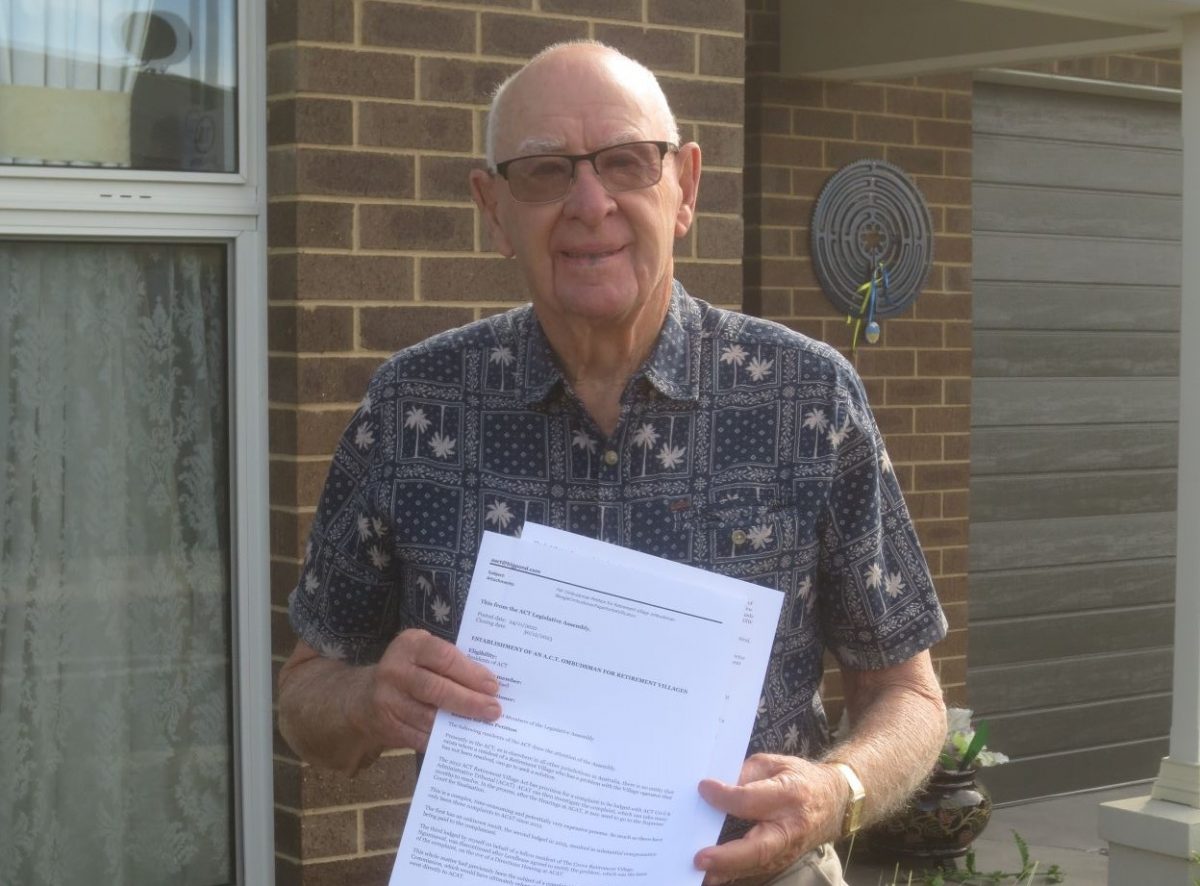
Retirement village resident John Beagle and the petition. Photo: Kay Beagle.
A push for an ombudsman to be established specifically to resolve ACT retirement village disputes has been rejected.
In March, the Legislative Assembly passed a resolution requiring the ACT Government to investigate the call after two petitions were launched late last year including from John and Kay Beagle, residents of The Grove retirement village in Ngunnuwal.
The government tabled its response in the Assembly on Tuesday (19 September), arguing that current arrangements were adequate, although it acknowledged that the role of the ACT Human Rights Commission in handling retirement village disputes was not widely known.
The government also said the cost of setting up a new ombudsman could not be justified given other demands on the justice budget.
Attorney-General Shane Rattenbury told the Assembly that recent reviews of the ACT retirement village legislation had resulted in significant changes to improve the handling of disputes.
These included setting up internal dispute committees in villages (2016) and making the ACT Human Rights Commission (HRC) a place residents could go to resolve a dispute (2019).
Mr Rattenbury said the report found that the HRC offered accessible, collaborative and efficient dispute resolution services, but that it was underused in the retirement villages sector.
“The government has identified that there are opportunities to increase awareness of the Commission and the breadth of its powers,” he said.
It would do more to promote its services, including by working with the Retirement Village Residents Assocation (RVRA).
The report said this would include providing information directly to retirement village residents, offering information sessions to village operators and residents, and working with the RVRA to improve complaint pathways for village residents.
The government had recently updated the Retirement Villages Handbook, an online resource for residents, which now contained more information on dispute resolution options, particularly the HRC, and support services.
Mr Rattenbury also said the government would write to village operators in the ACT to remind them of their obligation to establish internal disputes committees and to ensure that residents were aware of the committee and its functions.
The petitions argued that the internal disputes committee system was not working and that residents faced considerable barriers to seeking redress including health issues, technology, social isolation, cost and the power imbalance between residents and for-profit village operators.
However, the report found that residents had the option of going to Access Canberra, the HRC or ACAT if that failed, but these were not being used to their full potential.
It also said that establishing an ombudsman could fragment the dispute resolution system and confuse consumers.
There was also no guarantee that disputes would be resolved quickly, nor would they be necessarily binding. And if they were, this approach could make the process more formal and less accessible.
But the report said the government would also work with the RVRA and other key stakeholders to consider whether other improvements to the legal and regulatory framework could be made.
“For example, noting that the complexity of retirement village contracts was a key theme in consultations, the Government will explore whether a standard form contract should be introduced in the ACT,” it said.
ACT RVRA secretary Anne Caine said that while disappointed that the territory would not be the first jurisdiction in Australia to have a retirement villages Ombudsman, the Association accepted the reasons provided by the government for not proceeding.
But she said the investigation uncovered that the range of existing, and possibly effective, avenues for residents to pursue if they have a dispute were generally not known about, properly understood, or utilised.
“We welcome the Government’s commitment to enhance the existing dispute resolution arrangements by more effectively promoting these avenues to RV residents,” she said.
“In particular, we accept that the Human Rights Commission could be a very valuable forum for residents to resolve their disputes, and we thank Karen Toohey, the Human Rights Commissioner with responsibility for resolving dispute in this area, for her positive engagement with us and her recent actions to promote her role to all RV residents.”
Ms Caine also noted government’s intention to contact all ACT village operators to remind them of their legislative obligation to establish an internal dispute committee to assist the residents of their villages to resolve disputes that arise.
She welcomed the government’s commitment to work with the ACT RVRA and other key stakeholders on improvements to the legal and regulatory framework so residents better understand and enforce their rights.
“We also welcome the government’s commitment to explore the possibility of introducing a standard contract for those entering ACT retirement villages – as currently exists in NSW – to replace the myriad of extremely complex contracts that are currently being offered to prospective ACT RV residents,” Ms Caine said.




















